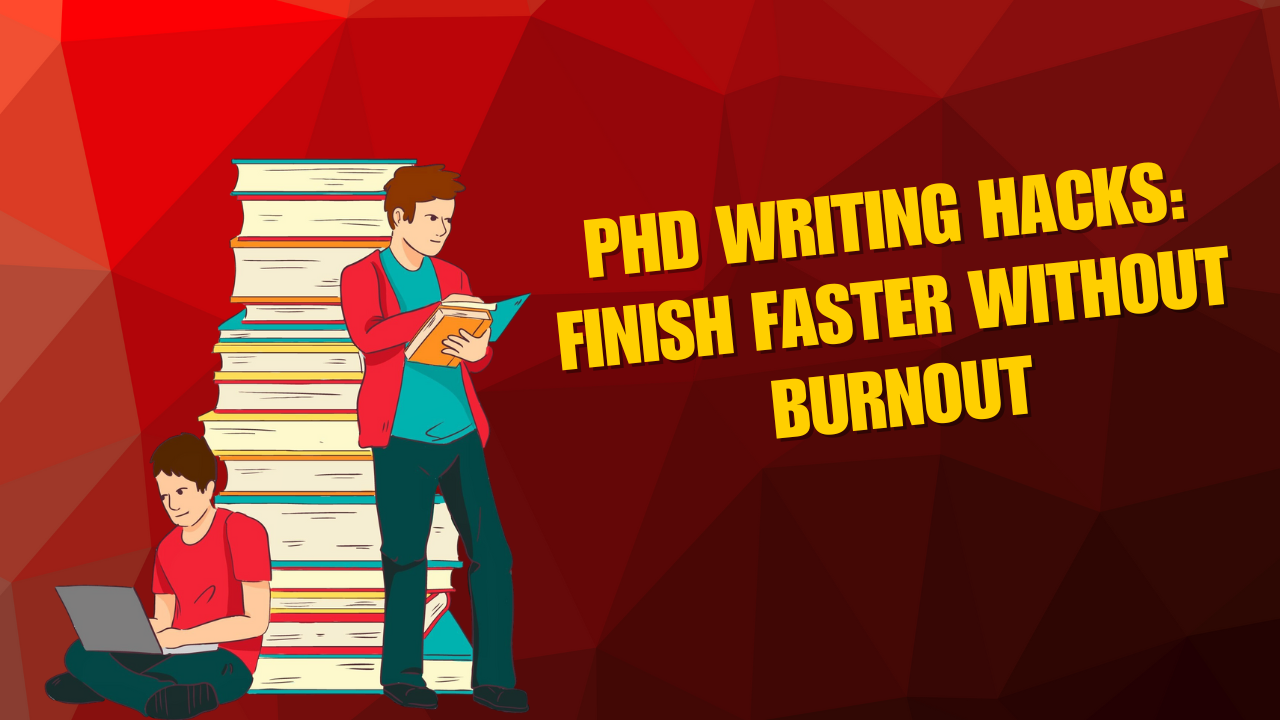08Jun

Completing a PhD thesis is a monumental task. It’s not just about writing; it’s about writing well, writing consistently, and—most importantly—writing without burning out. The journey can feel like a marathon, especially when you’re juggling research, deadlines, publishing, teaching, and possibly a personal life. But what if we told you that finishing your PhD faster and without burnout is possible? In this blog, we’ll uncover practical, science-backed PhD Writing Hacks that will help you accelerate your thesis progress while protecting your mental health. Whether you’re just starting or stuck midway, these PhD Writing Hacks will help you regain momentum and avoid the all-too-common burnout.

Before we jump into the hacks, let’s understand the root causes of burnout in PhD writing:
Instead of vague intentions like “write today,” set SMART goals—Specific, Measurable, Achievable, Relevant, and Time-bound.
Example: “Write 500 words for Chapter 2 between 10–11 AM” is more effective than “Work on literature review.”
Pro tip: Break your thesis into micro-goals like writing just a paragraph, a section, or even editing one page.
This classic time management method helps you stay focused while preventing mental fatigue.
How it works:
This method keeps your brain fresh and combats procrastination.
Build habits by anchoring your writing to a routine:
Rituals reduce the mental load of “getting started” and reinforce consistency.
Writing faster isn’t just about typing quickly—it’s about structuring your ideas efficiently.
Top tools:
Bonus Tip: Use tools like Kenfra’s advanced plagiarism checker to ensure your content is original before submission.
The biggest writing trap? Editing as you write. It’s a form of productive procrastination.
Instead, follow the two-phase rule:
This increases writing speed and builds momentum.
Don’t reinvent the wheel. Use institutional templates or look at approved theses from your department.
Benefits:
Just make sure you cite and paraphrase properly—don’t copy content.
Burnout often comes from overworking and under-resting. Make rest a non-negotiable part of your weekly plan.
Add to your calendar:
Remember: A rested brain writes better.
Not all writing hours are equal. Track your biological prime time—when your focus is sharpest—and reserve it for deep work like writing or analysis.
For most people, this is:
Save admin or easy tasks (emails, citations) for low-energy periods.
Writing is lonely. But it doesn’t have to be.
Find support through:
Platforms like Kenfra offer structured peer and mentor support—ideal if you’re stuck, demotivated, or confused.
Mindfulness isn’t just for meditation—it’s a tool for writing awareness.
How to apply it:
This calms your mind and helps you write with clarity and intention.
Kenfra’s expert mentors also suggest maintaining a writing log: Track how much you wrote each day, what worked, and what didn’t.
The goal isn’t just to finish your PhD—it’s to finish it strong, sane, and satisfied. By adopting smarter PhD Writing Hacks, building sustainable habits, and protecting your mental energy, you’ll not only reach the finish line—you’ll cross it proud and burnout-free. So, take a deep breath, pick one of these PhD Writing Hacks, and start today. Your future self (and your bound thesis) will thank you.
At Kenfra, we guide scholars through every step of their thesis journey—from topic selection to publication. Whether you’re struggling with literature review, structuring your chapters, or avoiding plagiarism, we’re here to help you write faster, better, and without burnout.
Kenfra Research understands the challenges faced by PhD scholars and offers tailored solutions to support your academic goals. From topic selection to advanced plagiarism checking.

A PhD is often described as one of the most challenging academic endeavors. It requires years of dedication, research,... read more

How to Write a Winning Research Proposal Format for PhD Learn how to write Research Proposal Format for PhDA... read more
State Eligibility Test (SET) The State Eligibility Test (SET) is a common eligibility test conducted in India to determine the eligibility... read more

Many students wonder: Can I do a PhD after MBA? The short answer is yes, absolutely. A PhD after MBA... read more

At Kenfra Research, we understand the challenges PhD students face in their academic journey whether you're struggling to select... read more

Navigating Common Research Proposal Challenges: A Guide for Scholars Crafting a compelling research proposal is a critical step in your... read more
PhD entrance tests can streamline the application process and make it more convenient for prospective students. E-applications often enable applicants... read more
WhatsApp us
Leave a Reply